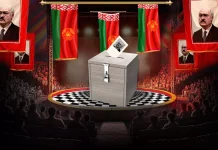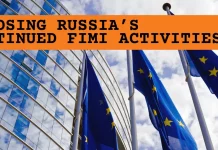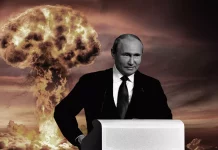
When a minivan with eight Russian and European journalists and human rights activists was attacked on March 9 by a band of professional thugs near the border of Ingushetia and Chechnya last week, the story was covered briefly in some world news outlets but didn’t attract much attention. Putin’s war in Syria has distracted from the war in Ukraine; both wars have distracted from the lower-level, even if worsening conflict in the North Caucasus, Catherine A. Fitzpatrick wrote for The Interpreter.
The group of travelers included four Russian journalists — Yegor Skovoroda from MediaZona, Aleksandrina Yelagina from The New Times, and photographers Mikhail Solunin and Anton Prusakov — as well as two Europeans: Lena Maria Persson Loefgren of Swedish Radio and Oystein Windstad of Norway’s Ny Tid. They were accompanied by three members of the Russian non-governmental Committee to Prevent Torture (KPP): Timur Rakhmatulin, Ivan Zhiltsov, and international lawyer Yekaterina Vanslova.
The party had flown to Grozny airport and hired a van the next day to take them to Karabulak, Ingushetia, to the office of the KPP, forced to move out of Grozny after the torching of its office in December 2014. The group was followed while strolling in Grozny and later driving in Ingushetia, first by men in a Lada Priora (a Russian compact car), and later by a black Mercedes with the license plate “666” and tinted windows. The activists shrugged at the tail, which was common in Russia.They visited the family of a man who had died while in custody of the Investigative Committee in Grozny, then drove to Beslan to the memorial site of the 2004 terrorist siege of a school which ended with the deaths of at least 385 people, including 186 children.
As Skovoroda wrote in an account of their journey in MediaZona, a local policeman stopped them at one point and they continued to be shadowed but they didn’t encounter the crowd of 15 or 20 thugs with clubs until later that night as they approached the Chechen border. The attackers cut off their Volkswagen minivan, then began breaking the windshield and windows with sticks. The assailants shouted in Chechen and Russian, “You don’t represent anyone!” and “Get out of here, there’s nothing for you to do in Chechnya!” “Allah Akbar!” and finally “You are defending the murderers of our fathers!”
The attackers not only beat the passengers severely — battering Windstad’s face and body, knocking out his teeth, injuring Vanslova’s leg and leaving others with bruises and cuts — but took their cameras and cell phones and then set the Volkswagen on fire. The driver, a local man named Bashir Pliyev, suffered a broken arm, leg and rib in the attack but endured something worse when he saw the flames: “There goes my livelihood!” he sobbed – he still had a loan for the car to pay. Ingush police arrived promptly and tried to help, taking the travelers to the hospital and opening a criminal investigation.
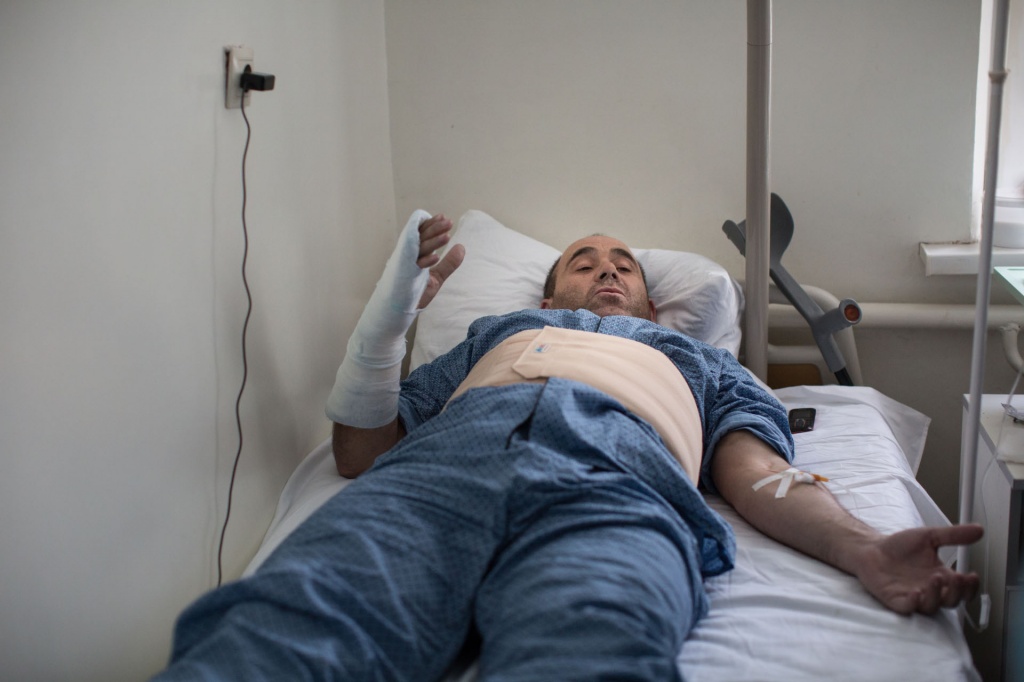
As the police were questioning the victims about what happened, another band of masked men armed with pistols and machine guns broke into the KPP’s office and trashed it, grabbing equipment and leaving so hurriedly they even forgot one sack of laptops they had packed.
While they were waiting to sign statements, the journalists had one of those moments that makes people persist with Russia: one Ingush policeman begin to recite from the “The Novice,” a poem by 19th-century romantic writer Mikhail Lermontov, celebrated for his works about the Caucasus.
“Often I did hear how you did save me, sir, from an untimely grave – for what…” and the other policeman picked up the rhyme and continued “…alone, and glum, and pale, a leaf torn off by blast of gale…” The ancient story of a Caucasian boy taken by a Russian military officer from his home, then left to be cared for by monks, still resonates after centuries of warfare, notably two wars in the last decade followed by recurring “counter-terrorism operations.”
The journalists had come to Chechnya specifically to speak with victims of the Kadyrov regime. Windstad had come to follow up on a very specific Norwegian story – two Chechen men who had sought refuge in Norway were denied asylum and sent back to Chechnya; one was later found beaten to death in a creek, the other is still missing.
In an interview with Aftenposten, Windstad, said “I thought I would die,” as he was dragged out of the van. In a video interview with Rakhmatulin, Windstad described how one of the marauders was not wearing a mask so he looked him straight in the eye and tried to talk to him. Salaam alaikham, said Windstad and tried speaking some Chechen. “We come in peace.” For his trouble, the Chechen stabbed in the chest with a sharp stick.
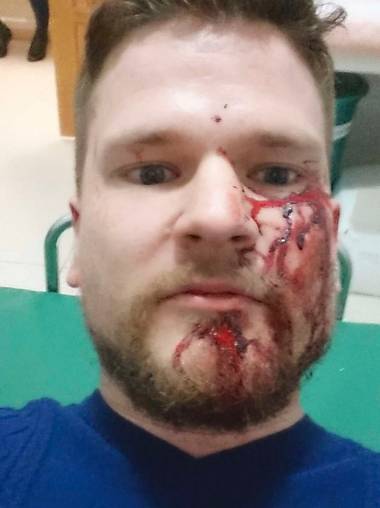
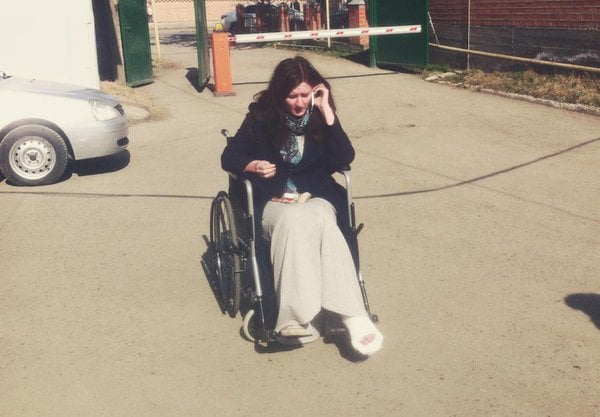
Later Yelena Milashina, a seasoned journalist from Novaya Gazeta — who covered Kadyrov’s reprisals against the families of terrorists, photographing their burnt homes and herself suffered death threats from a Chechen official — chastised Igor Kalyapin, the lawyer who heads the KPP for not telling the foreign reporters that they had experienced a recent escalation of harassment.
One of the KPP members had been nearly kidnapped, then forced to quit under pressure after being summoned directly by “Lord,” the nom de guerre of Magomed Daudov, the speaker of parliament and Kadyrov’s former comrade-at-arms and chief of staff – perhaps the second most powerful man in Chechnya .
Milashina described nine attacks on reporters in February that hadn’t discouraged coverage completely — “Kadyrov is a golden vein” for reporters, she commented sardonically. “Nevertheless, journalists who write about themselves are just as useless as human rights activists who defend only themselves,” she concluded.
Milashina herself, who also covered the “green corridor” of Chechen rebels making their way to fight alongside ISIS seemingly with the blessing of Russian intelligence, was forced to flee Chechnya after threats over her critical reporting on forced marriages. While the journalists and activists were not neophytes in the region and already knew of the severe level of repression, Milashina has a point. At what point do you stop, because the sacrifice of your own safety is not worth it and you’ve become the story?
The attack is likely the worst on journalists in this region since the two Chechen wars in the 1990s, when journalists were routinely stopped, beaten, kidnapped and even killed. It’s a significant order of magnitude beyond Kadyrov’s routine public ridicule and jeering, and even the cakes thrown by Chechen policeman at PARNAS chairman Mikhail Kasyanov; now Kalyapin has been more seriously attacked today having first been expuled from his Grozny hotel room by the police, then assaulted by masked men who beat him and drenched him with indelible green disinfectant known as zelyonka and flour — a typical shaming technique used in the region.
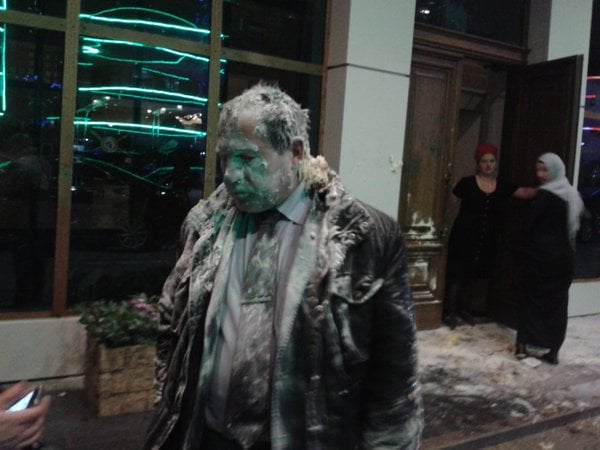
Such brutal assaults not only discourage reporting; it also may cause journalists to avoid human rights workers as guides. The head of the Ingush parliament complained that if the journalists had taken a government escort, the attack wouldn’t have happened. In fact, some journalists and human rights researchers opt to take armed guards in this region although they are divided about this practice because it can attract more violence.
Casual thuggery is common in the region, but this was a definite message-sending with the heavy tailing, the statements made during the attack, and the follow-up raid on the office. These were not people merely angry about Charlie Hebdo; they were on a mission. There has been some speculation that the bomb blast in Ingushetia against a popular imam who had been attacked before, soon after the journalists’ attack, was related. Others have said it was unrelated as the events had different antecedents and dynamics.
Kadyrov himself, who is often voluble and even vicious in his attacks on the Russian opposition, was at first curiously silent after this attack – too silent. He posted a picture of himself cradling a baby lion and a notice from the Chechen Tourism Ministry that Chechnya is “open to all those who come in peace.” Then the Chechen human rights ombudsman blamed the KPP for staging the attack, and a statement was issued denying any links between Kadyrov’s past comments and this incident.
What was the reason, or more practically, the effect of such a brutal intervention?
The timing of the attack seems linked to the reality that soon, Kadyrov will step down and one of two things will happen – either he will simply be approved for another term (as Kremlin sources hint) even if fraudulent elections need to be staged to legitimate him, or he will be cosmetically removed but replaced with a close associate, such as “Lord,” or Adam Demlikhanov, the Chechen MP with more experience in Moscow. Perhaps the Kremlin finds it prudent to have Kadyrov cool off from a year of outrages, starting with the brazen assassination of Boris Nemtsov steps from the Kremlin for which officers of Kadyrov’s own “personal army” are now in custody.
A third thing – serious demotion or even prosecution of Kadyrov – seems unlikely, given the instability this might trigger in Chechnya and Russia in general. Other governors in other regions have been prosecuted and replacements moved in deftly by Moscow, but Putin may need Kadyrov – not only to keep Chechnya suppressed but to contain neighboring Ingushetia, whose leaders have had a different, more amenable idea about how to handle religious strife between Salafis and Sufis which doesn’t suit Moscow.
The figures discussed as possible successors do lack something Kadyrov has had, however — high and deep connections in Moscow, without which no leader of Chechnya can exist, given the dependency on subsidies. A key figure is Viktor Zolotov, Putin’s former body guard and commander of the Interior Ministry’s Internal Forces, who visited Kadyrov last August quietly and “reviewed the troops” and is featured among Kadyrov’s Instagram panoply.
Yet precisely because journalists are kept out and even Kadyrov’s fellow social media users are intimidated, we don’t know some of the most basic things about Chechnya – whether the rumors are true that Kadyrov can’t even get Putin to take his phone calls.
“Who Hasn’t Understood, Will,” is the title of a movie said to be coming soon about Kadyrov, and a tag line he repeats frequently on Instagram as a kind of threat. In two weeks, Kadyrov might be suddenly sent to Damascus to “help Assad with reconstruction,” as one theory has it – just as suddenly and surprisingly as the withdrawal of troops were announced.
Or not. But regardless of whom Moscow puts in power in Grozny, it will have a vested interest not to know too much about how business is taken care of there, and will only want to discourage reporters’ curiosity. After the drama of Kadyrov’s own personal fate is past, there is still the very-much-managed parliamentary elections to come in September – and the presidential elections of 2017. It was Boris Nemtsov who asked the question, in a post expressing alarm about Kadyrov’s growing army, of why a ruler in Moscow would ever want to rely on an outlying army in a one-time breakaway republic for his power base.
And yet Kadyrov has proven useful not only in battles in Ukraine, where Chechen police were reported to be among those who defeated the famous Ukrainian “Cyborgs” at the Donetsk Airport, but in organizing intelligence among fighters from Russia in Syria and Iraq. And the implications of Novaya Gazeta’s investigation about the contract killers who became known due to Nemtsov’s assassination is that they are from a professional corps of killers for hire who take care of all kinds of undesirables. Maybe the point isn’t the army far away in Grozny but the assassins living at the President Hotel in Moscow.
So there is another reason why Kadyrov may want to avoid pesky journalists in the coming months – the enormous scrutiny of Russia and the world that will bear down again on him and his relatives as Nemtsov’s case comes to try in a military court. Soon after Nemtsov’s murder, Zaur Dadayev, the alleged trigger man, an officer of the Sever Battalion whose deputy commander was Ruslan Geremeyev, Kadyrov’s relative, was arrested based on material evidence, according to the Investigative Committee, although Kadyrov called him a “true patriot.”
Putin has called on the Interior Ministry to look into the attack on the journalists and rights advocates, but no one expects any follow-up. We have taken for granted that there have been some hardy souls willing to keep enduring persecution to get the real story out of Chechnya. Now we will be left with only Kadyrov’s Instagram.
By Catherine A. Fitzpatrick, for The Interpreter



